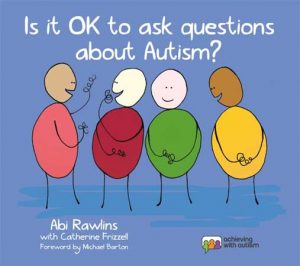By Abi Rawlins with Catherine Frizzell
Foreword by: Michael Barton
Publisher: Jessica Kingsley Publishers (21 Mar. 2017)
The foreword is by Michael Barton, who is the author and illustrator of ‘It’s Raining Cats and Dogs” and “A Different Kettle of Fish”
Michael originally met Abi and Catherine at the Autism show in London when they were trying to produce a video explaining what Autism was like for a variety of children from those of primary school age to those of being a young adult.
The book is primarily aimed at parents, schools, teacher and allies and the introduction describes how all the questions in the book were asked by primary school students who wanted to learn about Autism so they could be more considerate and understanding of their peers.
- What is Autism
- When was Autism discovered
- How many Autistic people are there
- What causes Autism
- Are there different types of Autism
- If all Autistic people have the same condition, then how does it affect them differently
- Why is Autism called Autism
The second section of the book looks at question and answers to help understand how Autism awareness is so important. A parent, very eloquently says “whose responsibility is to ensure that Autism is better understood and accepted” and she suggests that the onus of acceptance, currently, is placed on the shoulders of those who wish to be accepted, however, this needs to be rethought. Surely it is important that the rest of society take ownership of this responsibility.
- Why is it important to learn about Autism
- Why don’t many people know about Autism
- Are there more Autistic boys or Autistic girls
- Do Autistic people need to be treated differently
- What things are good about Autism
- How does Autism affect talking
- Is there a school for Autistic people, and very interestingly goes on to say “yes, your school”
- Is it easy to make friends when you are Autistic
- My friend is Autistic, how can I help them if they are feeling worried or scared
- How can you help someone who is Autistic to understand games
- Do Autistic people think differently to people who are not Autistic
- Are there differences between Autistic boys and Autistic girls
- My friend is Autistic, will she be able to do the same things as me when she grows up
- How can I be a good friend to someone who is Autistic
- How do lights, noises and smells affect Autistic people
- My cousin in Autistic, why does she find it difficult to look at me when we are talking
- Why does my Autistic friend do things over and over again
- Does Autism run in families
- What does Autism do to your brain
- Does Autism affect learning at school
- Can you grow out of Autism
- Is Autism a disability
- How do you know if someone is Autistic if you can’t tell by looking at them
- Can pets be Autistic
- Is it ok when someone is Autistic
- Can you catch Autism
- Can you die from Autism
- Is it normal for people to feel uncomfortable around Autistic people
- Explaining about the social stress
- The breaks that other people find rewarding and a place to recharge their batteries actually put enormous stress on the person with Autism
- Focusing on the positives
- Being alert for sensory needs
- Helping with Transition times
The book is beautifully illustrated and I wholeheartedly recommend it.
I shall be bringing it to the post-diagnostic support group on the 12 April and I am looking forward to seeing you all there.
Consultant Clinical Psychologist
& Director of Axia ASD Ltd.
Share This Post:









Leave a Reply